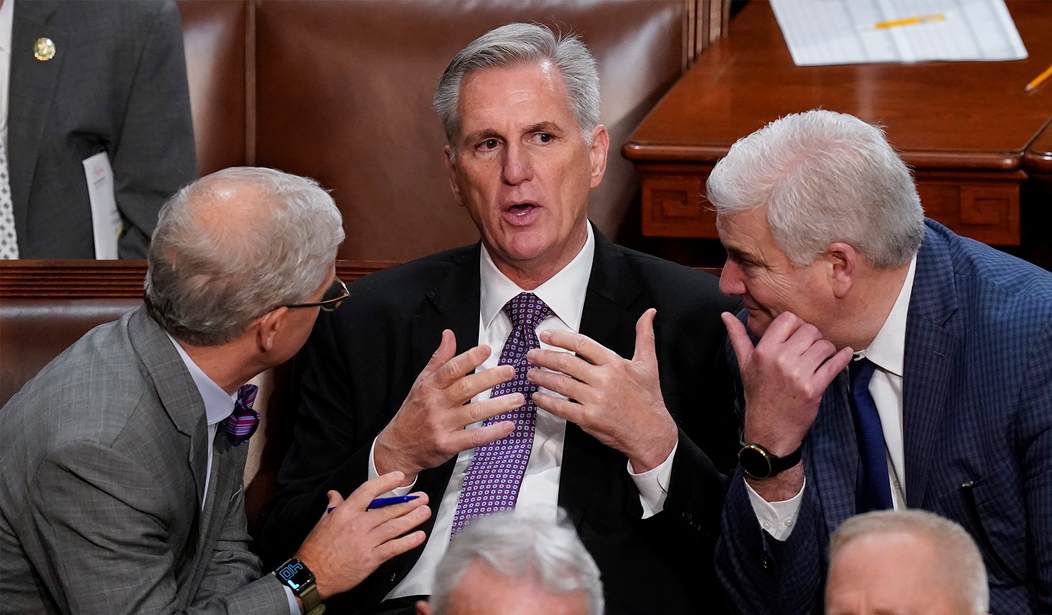The very term "debt limit" makes a mockery of any kind of responsible budgeting. Each time the government reaches the "limit" it gets raised with the familiar scenarios that include threats of a government shutdown (an idea that increasingly appeals to some conservatives) and the claim that the "full faith and credit" of the U.S. is at stake. We have faith and credit? Who knew?
Republicans usually cave, or in the case of a shutdown, succumb to media pressure and the Democrats and allow the spending and debt to grow, along with trillions in interest on our $31.4 trillion debt.
And Republicans are no different. President Ronald Reagan took the deficit from $70 billion to $175 billion. Bush41 took it to $300 billion. Clinton got it to zero. Bush43 took it from zero to $1.2 trillion. President Obama halved that to $600 billion. Trump jumped it back to 3.3 trillion.
But maybe not this time? House Republicans have passed a bill that could put Senate Democrats and President Biden on the defensive. Yes, it would raise the debt limit, though only for one year, but it also would do something unheard of in Washington in recent years and that is reduce spending.
The proposed cuts are small - just $4.8 trillion compared to the overall debt - but just as a journey of a thousand miles begins with a single step, breaking an addiction to constant spending increases and more debt begins with a step in the opposite direction.
Democrats appear interested in focusing solely on the debt ceiling, not the need for spending cuts. Neither do they appear interested in negotiations with Republicans. What happened to President Biden's promise to "lower the temperature" in Washington and restore bipartisanship? Maybe he forgot as he failed to recall his recent trip to Ireland when asked by a child, "What was the last country you traveled to?" Another child had to remind him.
Recommended
Clearly not interested in the House bill, Sen. Richard Blumenthal (D-CT) said, "I think we need to focus on the debt ceiling. There's an urgency here that absolutely requires immediate attention." Blumenthal did seem to leave the door slightly open to a deal when he added, "I think the president should sit down with Kevin McCarthy to talk about the debt ceiling and then, at some later point, talk about the budget."
That sounds to me like bait and switch. It is reminiscent of the "deal" made between then-Speaker of the House Jim Wright (D-TX) with President George H.W. Bush. Wright said he would agree to spending cuts if Bush would first agree to a tax increase. Wright got his tax hike, but Bush never got his spending cuts and the concession doomed Bush's re-election.
Maybe this time things will be different if Republicans can get their message about the danger of massive debt through to the public in time to overcome the Democrats' predictable scenario of a government shutdown. If a corporation engaged in what Democrats are doing it would be called extortion. But the rules don't ever seem to apply to Democrats who keep changing them as needed to maintain political power.
The last Democrat to behave responsibly on the economy was Bill Clinton. According to the Congressional Budget Office, Clinton had "budget surpluses for fiscal years 1998-2001, the only such years from 1970 to 2023. Clinton's final four budgets were balanced budgets with surpluses, beginning with the 1997 budget. The ratio of debt held by the public to GDP, a primary measure of U.S. federal debt, fell from 47.8% in 1993 to 33.6% by 2000."
It's enough to make one nostalgic for those good old economic days.

























Join the conversation as a VIP Member